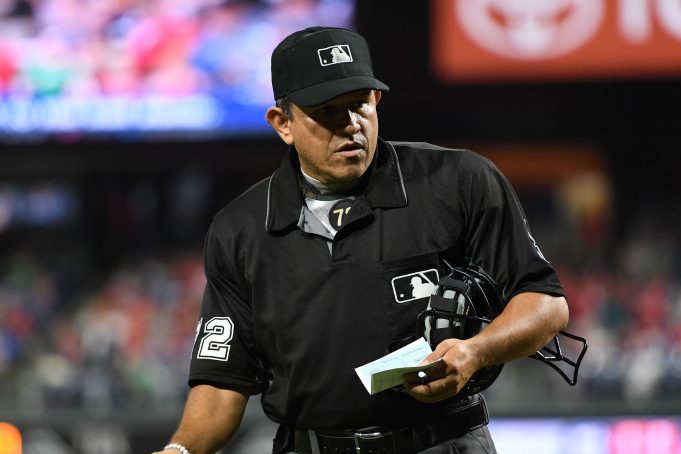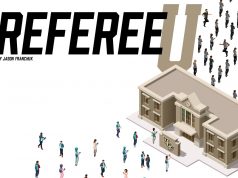By Dan Ronan
major League Baseball umpire Alfonso Márquez was driving April 21, 2005, to an early season game in Tampa, Fla., when he got the news. His close friend, 37-year-old NHL linesman Stéphane Provost, died in a motorcycle accident at about 3:30 a.m. in Weston, Fla. Earlier that night, Márquez, Provost and friends had gotten together at the Hard Rock Cafe after Márquez’s crew worked a game in Miami.
“We were very close,” Márquez said. “Not only did we wear the same number, 72, but we were both immigrants to the U.S., and Stéphane and I both loved motorcycles. We hit it off immediately. I even took his motorcycle for a ride that night. I thought the person who called me was kidding. It was a very hard day.”
Years after his friend’s death, Márquez keeps one of Provost’s NHL striped shirts in his equipment trunk and has hung the shirt in his umpiring locker at every stadium he worked. And in the center of his chest protector, there’s a 72 patch NHL officials wore to honor Provost.
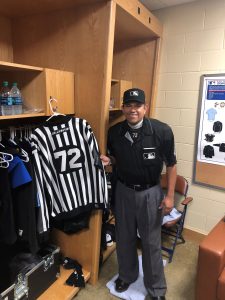 Márquez says Provost’s death was one of a number of incidents over the intervening years that indicated to him he needed to make some significant changes in his life. At 28, in the last month of the 1999 MLB season, he had achieved his goal of making it to the major leagues. He was hired full time a few months later, and he was a highly regarded umpire.
Márquez says Provost’s death was one of a number of incidents over the intervening years that indicated to him he needed to make some significant changes in his life. At 28, in the last month of the 1999 MLB season, he had achieved his goal of making it to the major leagues. He was hired full time a few months later, and he was a highly regarded umpire.
But problems off the field were looming. Fellow crew members and friends had told him on more than one occasion that he was drinking too much. They feared he might get a DUI and lose his MLB job or end up in other trouble.
“This was definitely another piece in the puzzle. It made me reflect a bit. It was part of it,” he said. “I was a ‘I would have a drink every day’ type of guy.”
But it would be another four years before Márquez made the decision to stop drinking once and for all.
“I’ve known Fonzy for 30 years,” recently retired MLB umpire and crew chief Ted Barrett said. “It’s been a long relationship. He’s my best friend.
We do a lot of things together.
“It got to a point where I kept thinking he would hit rock bottom. He never did. He just kind of kept going. And, you know, I feared for a couple of things. No. 1, that he loses his job. Or he’d turn up, you know, dead or in jail somewhere after a night of drinking.”
Barrett, an ordained minister who retired from MLB after 28 years on the field to pursue his calling as a minister, gave Márquez an ultimatum, telling him the friendship was over unless he stopped drinking.
“I finally got to the point where I had enough,” Barrett said. “And he’s not listening. He’s not going to listen. And he’s going to end up in a bad spot.
“But it was because of his wife, Staci. She never gave up on him.”
Eventually, Márquez saw the light and knew he needed to make some changes. But it didn’t come easily.
“I’m stubborn, hard-headed, and set in my ways,” he said. “I wasn’t ready to admit a lot of things. We always feel these things aren’t going to happen to you, and I was lucky enough to be able to say, enough is enough. I need to stop.”
Márquez says his decision to give up alcohol also came with a spiritual awakening that has brought him to a contentment he had never felt before and recognition things needed to change.
“I started thinking about the sacrifices my family made to come to this country, the amount of time, effort and sacrifice it took for me to get to the big leagues, and all the blessings that came with that — my wife and three children were all going to be put in jeopardy,” he said.
“It would have been very stupid of me to put all of that in jeopardy by continuing to keep drinking. It was actually controlling my life. So I just had to step away and quit drinking.”
Coming to America
Of all the MLB and Triple-A umpires currently working, Márquez may have had the most difficult road to achieving the highest level in his chosen field.
He was born into poverty in 1972 in the tiny pueblo of La Encarnación in the Mexican state of Zacatecas.
At age 7, his father, Antonio Márquez, made the decision to seek a better life in the U.S. and moved to California, leaving the family behind for a year and promising to bring his wife, Hermelinda Márquez, 8-year-old daughter Cecilia, and Alfonso to the U.S. as soon as possible. Alfonso also has an older sister, Aurora, who remained in Mexico and lives in Guadalajara.
 Another sister, Hermelinda, named after his mother, was born in the U.S. after the family settled here.
Another sister, Hermelinda, named after his mother, was born in the U.S. after the family settled here.
“He worked for a year to save some money and pay for us to come up here,” Márquez said, recounting the story of how he arrived in the U.S. “We got on a bus and rode it for two days to Tijuana.”
He recalls the family spent the night in a “nasty hotel” before continuing the journey with the help of a “coyote,” who was paid to smuggle the three across the border into Southern California.
“We just started moving toward it and hiding,” he said, recalling the events of that extraordinary day. “Every so often, the Border Patrol would cruise by and kind of shine the light and spotlight, and we would just hide. Then I got to the point where I guess my sister and I got a little tired. So he came and picked us up one under each arm, and away we went.
“I remember coming up to a huge chain-link wall or a fence, and there was a hole. We were put through that hole, and we were trying to walk in the dark. I do remember being scared, not knowing where I was, and I just knew that we were going to go see Dad.”
But they still had a long way to go once they got to the U.S.
“We got to this house, and it got dark. And I just remember the coyote saying, ‘Just crawl on the floor and find an open spot. And tomorrow morning, we’ll go the rest of the way,’” Márquez said, emphasizing every detail of that trip. “We slept on the floor in the house, woke up the next morning and there were a bunch of people in that house.”
A few days later, the family was reunited in El Monte, Calif., east of Los Angeles.
“We hadn’t seen him for a year, and I just remember we were dropped off there, and my dad was there, and life began in the United States. This was back in 1978,” he said. “I wasn’t even 8 years old.”
The family relocated to Fullerton, where his dad was a gardener and his mother worked as a seamstress. Márquez didn’t speak English, but he was anxious to learn, and the school was bilingual.
Márquez says he was a good student and he learned a valuable lesson about integrity when he got caught cheating while in a class at Nicolas Junior High School.
“There was this teacher, Mr. Jim Schlotthauer, a history teacher I really liked. He was awesome, but I got caught cheating on one of his tests,” Márquez said. “He threw me out of his class. But I wanted to stay, and he made me carry a card stating I was doing good and attending classes. Every teacher had to sign it, and I became a straight-A student and went to high school, taking honors classes.”
A few years ago, the 40-year veteran teacher and Márquez reunited when Schlotthauer, who was still at the school, invited Márquez to speak at his old junior high.
“We’re very proud of Alfonso,” Juan Fonseca, Fullerton School District’s community liaison, said. “After he was done speaking to the class, he stuck around and talked one-on-one to the students, signed autographs and was very friendly.”
A Fire Ignited
In both junior high and later at Fullerton High School, Márquez was a member of both the basketball and baseball teams. And it was there he first became interested in officiating because of a play during a summer league game when he was 12.
“I hit an inside-the-park home run but I missed second base,” he said, recounting that moment. “They appealed to the base umpire. Ken Avey was his name. He’s since passed. They appealed, and he called me out.”
Rather than argue the call, Márquez made a point after the game to find Avey and politely get an explanation of the rule.
“He was in the parking lot afterward, and I started asking questions about how he saw the call, what he was looking for, the rule and about umpiring,” Márquez said. “I was interested, and I thought if I do that in the summer, I can make a little money.”
Márquez was hooked.
His mentor, Avey, encouraged him and helped get him started with the local association.
“I started with the little guys, the tee-ballers, and then onto Fullerton Pony League. The inside-the-park home run was on the first field I ever umpired a game on, Amerige Park,” Márquez said. “I knew once I finished high school, I knew umpiring was it. I enjoyed it a lot. I was trying to find ways to raise money to go to umpire school.”
Umpiring money and a loan from Larry Cawhorn, an older umpire with whom he became friends, gave Márquez just enough money for a round-trip plane ticket from California and tuition for the Joe Brinkman-Bruce Froemming Umpire School in Florida in the winter of 1993.
“Larry gave the money to get to the school,” Márquez said. “Between my uncle and Larry, I was able to get tuition, the flight and pay for the meal plan at school.”
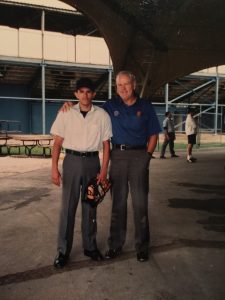
Brinkman, now retired, said Márquez was a diamond in the rough on the backfields in Cocoa Beach, Fla., home of the umpire school Márquez attended.
“He was one of those guys who showed promise right in the beginning,” Brinkman said. “He had a knack for it. He got our interest, and he’s proved it as he’s one of the better umpires now in the big leagues.
“He really wanted it. He realized there was an opportunity, and he put that extra effort into it. He went the extra mile.”
But Márquez’s dream was nearly derailed at the beginning of the trip to Florida.
“Two days in the school, I almost went home,” he said. “I didn’t have any money, not an extra penny. And I went to the wrong field and the instructors started giving me a hard time, and I thought I should just go home.
“I met a guy, a classmate named Scott Nelson, and he said, ‘Let’s go to Denny’s and go eat and study the rules. I have a car and a credit card.’”
Nelson and Márquez would work some MLB games together in 2001, 2002 and 2003 when Nelson was a Triple-A call-up. Nelson would umpire 69 major league games before being released. The two remain friends.
 Márquez finished strong enough at umpire school to be promoted to the Umpire Development Program’s extended camp and appeared to be on a fast track to being promoted.
Márquez finished strong enough at umpire school to be promoted to the Umpire Development Program’s extended camp and appeared to be on a fast track to being promoted.
He spent six-and-a-half years in the minors, working in the Arizona Fall League, Arizona Instructional League, Northwest League, Midwest League, California League, Southern League and Pacific Coast League before getting the call to the Show.
“I was lucky, blessed, it was basically one year at every level, and I kept getting promoted,” he said. “I got to Triple-A and then the fall league, and when I got to my first major league spring training, Marty Springstead, the American League supervisor of umpiring, said an umpire was ill and they needed me for games in Arizona.”
This was before MLB’s decision to merge the umpiring staffs from the two separate leagues into one, under the supervision of the Commissioner’s office.
“The next year, I got hired by the National League,” Márquez said. “The American League was interested, but when all that stuff went down in 1999, the National League hired me.”
That “stuff” refers to the ill-fated move by the umpires union to stage a mass resignation in order to force negotiations with MLB for a new labor agreement. In all, 57 umpires submitted their resignations during the season, and the leagues replaced 22 of them with Triple-A call-ups, some of whom are still on the field today.
Welcome to the Show
Márquez worked his first MLB game on Aug. 13, 1999, in the second game of a doubleheader between the Montreal Expos and Colorado Rockies.
“I was in Colorado Springs when they said we should go to Denver for my first big-league game, and my first game in the big leagues was behind the plate,” he said with pride.
He worked 30 games that season and joined the staff full time for the 2000 season.
Márquez has quickly cemented his reputation on the field as one of the game’s leaders, and he’s respected by his peers.
“In the final evaluations, I always told my instructors, ‘Is this student someone you’d want to go on the field with?’ Alfonso is that type of umpire,” Brinkman said.
Márquez and veteran crew chief Larry Vanover were together for four seasons, with Márquez serving as Vanover’s No. 2 man on the crew the final two seasons, a position that in most cases results in that umpire eventually leading his own crew.
“I like Alfonso as a person,” Vanover said. “I think he’s a really good umpire. He is as solid as they come, day in and day out.
“I didn’t know him, and we were kind of thrown together. The office was trying to match crews and they called and asked how about Alfonso Márquez as your No. 2. We were put together, and we had a great year. We got along off the field and we worked together very, very well. He knew what I was thinking and I knew what he was thinking. It was very positive and we stayed together for several years.”
In 2020, Márquez got the opportunity to lead his own crew. At 47, he left Vanover’s crew and was named a crew chief, becoming only the second Hispanic person to hold that honor, following longtime crew chief Rich Garcia.
In a wonderful marriage with his longtime wife, Staci, their children grown, and beginning his 24th MLB season, Márquez has amassed a significant resume that promises only to get better if he stays healthy and on the field for another decade.
At the end of the 2022 season, he had umpired 2,766 regular season games and 105 playoff or special event games, including four World Series (2006, 2011, 2015 and 2021), six League Championship Series (2003, 2008, 2013, 2016, 2017 and 2022), 11 Division Series (2001, 2002, 2005, 2006, 2011, 2012, 2015, 2018, 2019, 2020 and 2021), as well as the 2006 and 2018 All-Star Games.
By comparison, retired veteran umpire Gerry Davis worked 152 playoff or special event games. Joe West, baseball’s all-time total games leader, had 135 postseason or special event games.
Márquez has already been recognized by the Mexican Professional Baseball Hall of Fame in Monterrey, which has an exhibit to honor his MLB accomplishments.
Barrett says if Márquez does continue umpiring for another decade, he could put together a body of work that puts him among the all-time greats of the profession.
“Alfonso is a guy who deserves all the accolades that he gets and the ones he’s going to get,” he said. “I think one day we might all be sitting with him at Cooperstown when they enshrine him (in the Baseball Hall of Fame).”
Circle of Friends
Now an American citizen — he went through the citizenship process in late 2021 — Márquez still returns to his native Mexico on a regular basis. He sometimes takes along his MLB colleagues, including Barrett, to lead umpiring clinics and teach amateur and professional umpires on the finer points of the game.
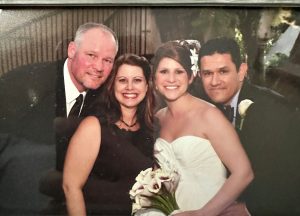 “Fonzy represents not just Major League Baseball and his family but the whole country of Mexico and especially where he’s from down there in Zacatecas,” Barrett said.
“Fonzy represents not just Major League Baseball and his family but the whole country of Mexico and especially where he’s from down there in Zacatecas,” Barrett said.
Márquez remains very close to his extended family. Before COVID, before MLB umpire rooms were highly restricted after games, it was not unusual to see friends and family members meeting with Márquez and planning events with him, especially in Los Angeles or Phoenix, where he now lives full time.
Ironically, when he and Staci were looking to move into a neighborhood, they found a house near the Barrett family, and they’re now not only best of friends but live nearby.
“We do a lot of things together, and we ride motorcycles together. We’ve got a group of guys we ride with, and we do that together. So we see each other quite a bit,” Barrett said.
“We’re like a family, and now that I’m retired, and I’m not traveling as much seven months of the year, I think we may actually see each other more.”
Márquez also works with Barrett on Barrett’s Calling for Christ ministry. He also volunteers in the umpires’ nonprofit charity UMPS CARE, which provides numerous programs for organizations from youth-based charities to visiting VA hospitals.
Márquez’s friends said his marriage to Staci, his faith, his decision not to drink and his determination to always push himself harder have put him in this position of leadership.
“He’s really in the top tier of the profession now, in terms of what he is doing on the field, in terms of how he handles himself. He’s really in the top echelon of the profession,” Barrett said. “He’s at the top of the top.”
And for Márquez, the journey is not something he takes lightly. He understands things could have turned out much differently than where they are.
“I’m very fortunate. I don’t take what I have for granted, what this country has given me, Staci, my family and of course, my faith,” Márquez said.
Dan Ronan is a Washington, D.C. journalist who is the Managing Producer/Senior Reporter at Transport Topics and a news anchor on SiriusXM Radio and all-news WTOP-FM. He is a retired NCAA baseball umpire and a small-college and high school basketball referee.
Note: This article is archival in nature. Rules, interpretations, mechanics, philosophies and other information may or may not be correct for the current year.
This article is the copyright of ©Referee Enterprises, Inc., and may not be republished in whole or in part online, in print or in any capacity without expressed written permission from Referee. The article is made available for educational use by individuals.

